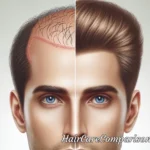Deciding to undergo a hair transplant is a significant step towards reclaiming your confidence and appearance. However, timing is crucial in ensuring the procedure’s success and optimizing its outcomes. This comprehensive guide delves into the best timing for a hair transplant, considering various factors such as age, hair loss progression, and seasonal considerations.
Understanding Hair Loss
Hair loss affects millions worldwide, with reasons ranging from genetics to lifestyle. Before considering a hair transplant, it’s essential to understand the underlying causes of hair loss. This knowledge will guide you in choosing the optimal timing for the procedure.
The Importance of Age in Hair Transplant
Age plays a pivotal role in determining the right time for a hair transplant. Undergoing the procedure at the right age can significantly impact its longevity and effectiveness. Learn more about the optimal age for a hair transplant and how it influences the procedure’s success.
Assessing the Progression of Hair Loss
Why Early Diagnosis Matters
Identifying hair loss at an early stage is crucial for effective treatment. Early diagnosis allows for a broader range of non-surgical options that might delay the need for a transplant or enhance its results if chosen later.
Understanding Hair Loss Patterns
Recognizing your hair loss pattern is vital before considering a transplant. Certain patterns may indicate ongoing hair loss, which could affect the surgery’s outcome. Predicting future hair loss can help in planning a more effective transplantation strategy.
Seasonal Considerations for Hair Transplant
Best Seasons for the Procedure
Did you know that the season in which you undergo a hair transplant can affect its recovery and success? Factors such as sun exposure and climate can influence the healing process. Discover the optimal season for a hair transplant to ensure the best possible results.
Post-Transplant Care and Seasonal Effects
Seasonal variations also impact post-transplant care. Specific seasons offer conditions more conducive to healing and comfort post-surgery. Understanding these seasonal nuances is key to a smoother recovery.
Considering Your Personal Schedule
When planning a hair transplant, consider your personal and professional commitments. The procedure and recovery period may require taking time off, so it’s advisable to schedule it during a less busy period in your life.
Strategic Timing for Hair Transplant
Strategically timing your hair transplant can maximize its success. Factors such as your career, personal life, and the progression of hair loss all play a part in deciding the right time. Balancing these considerations can lead to a more satisfying outcome.
Choosing the Right Clinic and Surgeon

The success of a hair transplant doesn’t solely depend on timing. Choosing a reputable clinic and experienced surgeon is equally crucial. Researching the best countries for a hair transplant can provide insights into where to find top-tier medical professionals and facilities.
The Role of Technology in Hair Transplant
Advancements in hair transplant technology have significantly improved the procedure’s effectiveness and patient comfort. Understanding these technological advancements can help you decide when to undergo the procedure, as newer techniques may offer better results with shorter recovery times.
Psychological Preparation for a Hair Transplant
Undergoing a hair transplant is not just a physical process but also an emotional journey. Ensuring you’re mentally prepared for the changes and the recovery process is crucial. This preparation includes setting realistic expectations and being ready for the emotional impact of the transformation.
Financial Planning for Hair Transplant
While the cost should never be the sole factor in deciding the timing for a hair transplant, it’s undoubtedly an important consideration. Financial planning can alleviate the stress associated with the procedure, allowing you to focus on recovery and results.
Conclusion
Choosing the best timing for a hair transplant is a multifaceted decision that requires careful consideration of various factors. From understanding the progression of hair loss to considering seasonal effects and ensuring psychological readiness, each aspect plays a significant role in the procedure’s success. Furthermore, selecting the right clinic and surgeon, possibly by exploring options in the best countries for hair transplant, can make a significant difference in the outcome. Ultimately, the goal is not just to restore hair but to do so in a way that enhances your overall well-being and confidence.






